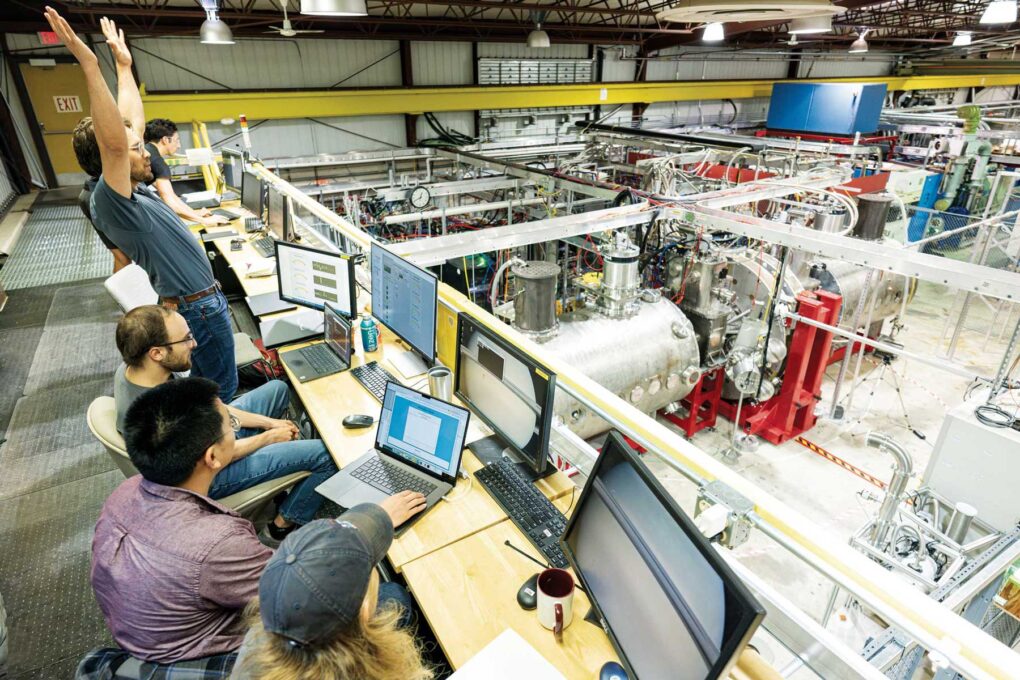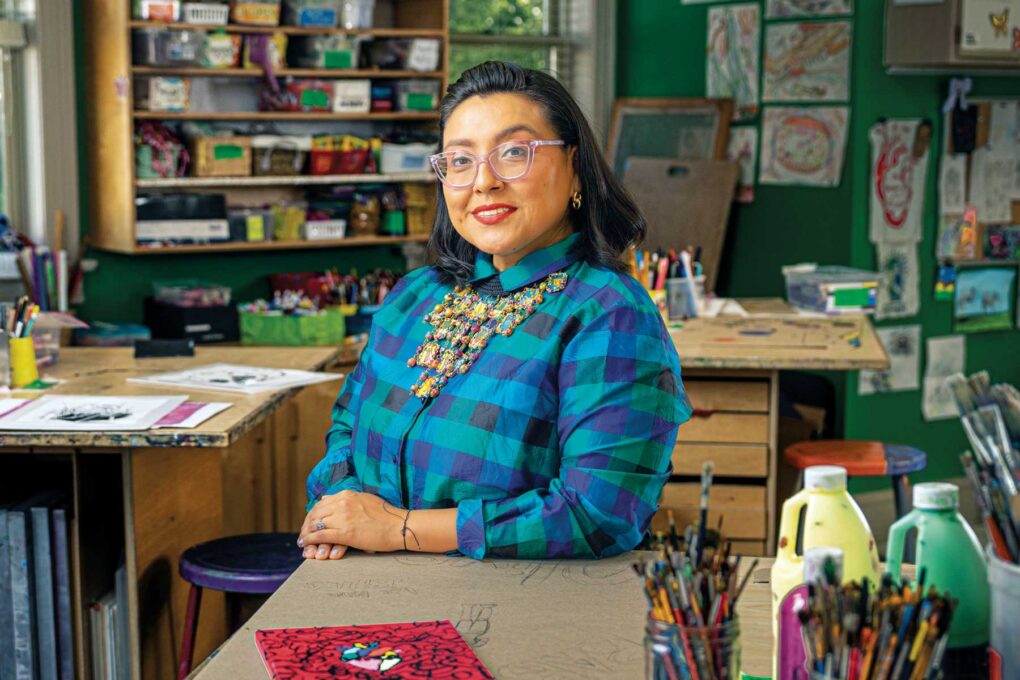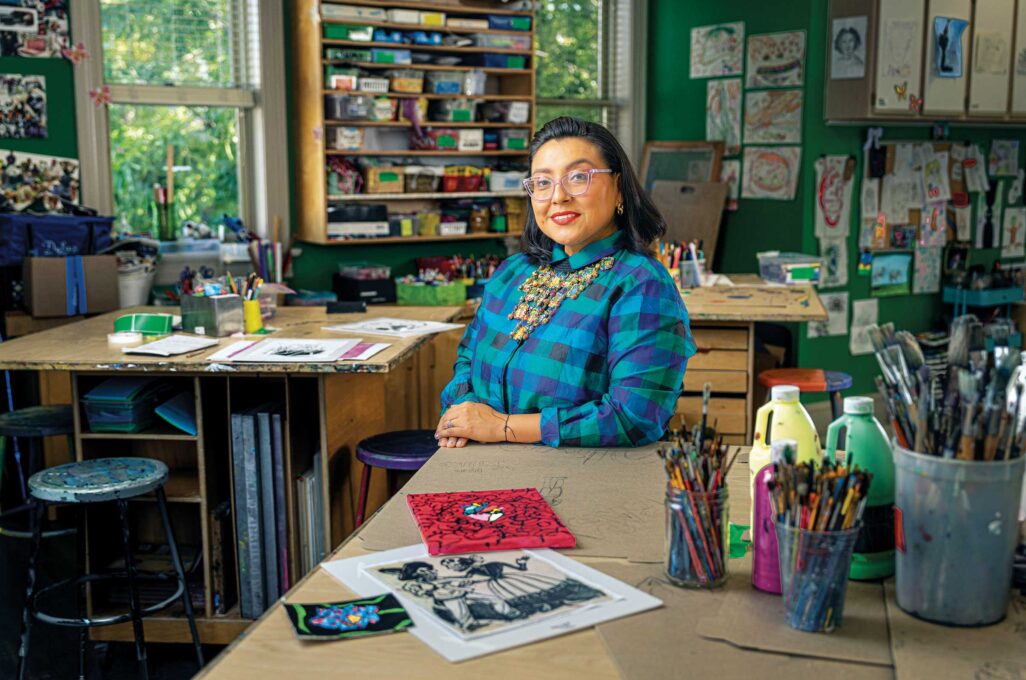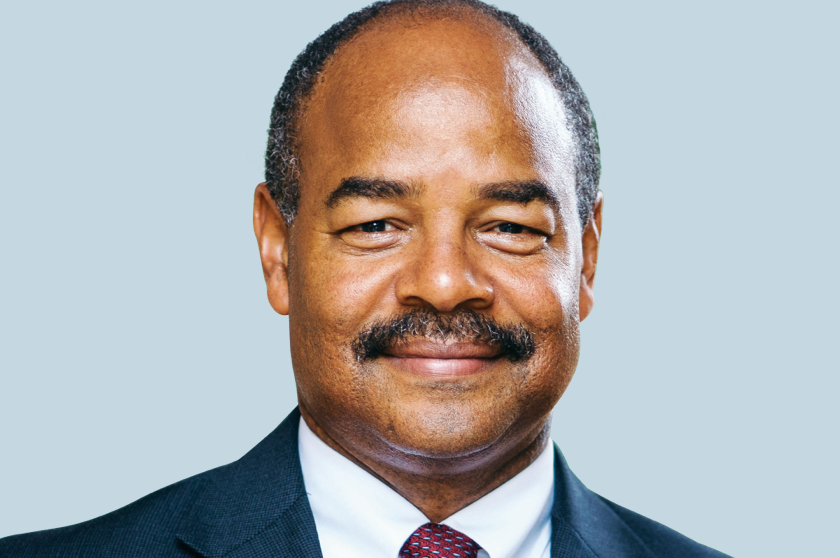The Arts Advocate
Marcela “Xela” García (’11, MA’24) was 9 years old when she first walked into Walker’s Point Center for the Arts (WPCA) in Milwaukee. She had moved to the United States only four years earlier with her parents and younger sister, after spending the first four years of her life in Jalisco, Mexico. Her mother worked at a clothing company a few blocks from the center, while her father cooked at a restaurant across town. When they heard about the center, which had just recently opened in 1987, they immediately signed their daughters up for after-school art classes.
“Growing up with parents that migrated, language barriers were there, cultural barriers were there,” García says. “To them it was really important to find organizations where we could feel understood and safe, and to connect us to opportunities that were nurturing for us. The center was transformative for me and my sister. But, of course, when I was a little girl getting dropped off to paint and draw, I never thought that I’d be leading the organization one day.”
Today, García is WPCA’s executive director. Since 2016, she has steered the center through funding turbulence and the chaos of the pandemic and brought the same transformative arts experience to hundreds of Walker’s Point children.
The center was transformative for me and my sister. But, of course, when I was a little girl getting dropped off to paint and draw, I never thought that I’d be leading the organization one day.
In 2002, García arrived at UW–Madison as part of the first class in the Precollege Enrichment Opportunity Program for Learning Excellence (PEOPLE), which provided her a full-tuition scholarship. She initially majored in bacteriology but quickly found lab work isolating and turned back to the love of the humanities she’d first found at WPCA, with majors in English literature and Chicanx/e and Latinx/e studies.
“I found a lot of passion in discovering the stories that not enough people have connected with,” she says. “These are universal stories but because of the last name of the author or the platform where it’s published, not everyone gets access to it.”
After graduation, García worked in education and nonprofits, from associate program director for Partners Advancing Values in Education (PAVE) to a trustee for the Sigma Lambda Gamma Education Foundation. When she heard about the executive director leaving WPCA, she was immediately interested in returning to the place that meant so much to her as a child … but she was also clear-eyed and a little wary.
“I would have been the fourth director in a period of five years,” she says. “So, I knew something was going on with leadership retention. Obviously, funding for the arts has been in decline for the last 20 to 30 years. I knew that I would be walking into something that maybe was not at its healthiest. I knew that this was going to be the biggest challenge I’d done professionally. And I was not wrong.”
Early in her career, the center flooded and needed repairs. COVID forced a temporary migration to digital programming. The center went through multiple strategic plans, rebranded, and developed new programming and outreach. But García ended the trend of leadership exodus and stuck with the center, shepherding it through the pandemic to where it is today — a thriving place for kids to find passion for the arts and a sense of belonging, like García did decades ago.
“Everything I’ve done here is about making the center more reflective of the community we serve,” she says. “It’s not about me or about a legacy I’m leaving behind. That’s the last thing on my mind. What matters is the number of kids who come through our doors and leave feeling more confident and more connected.”
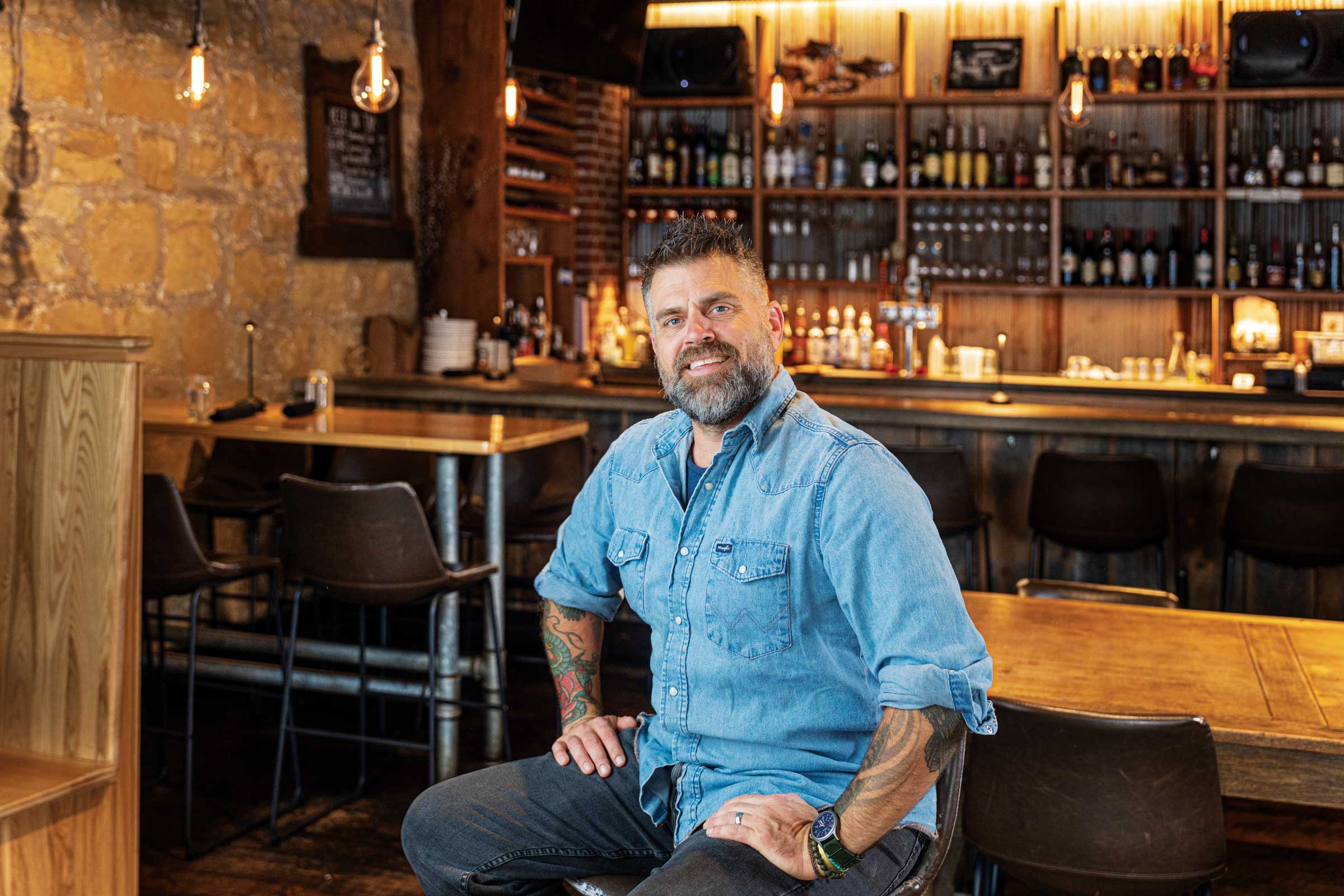
The Chef
Luke Zahm (’03) will never forget one meeting. The Wisconsin chef was in Los Angeles, pitching ideas to a television producer. It was 2019, and over the past six years, Zahm had made a name for himself running Driftless Café in Viroqua, a small-town restaurant that became a regional phenomenon, drawing diners from Chicago, Milwaukee and Minneapolis. Now, after a few guest appearances on dining TV shows, his screen presence — inviting, knowledgeable, friendly — was drawing interest.
The producer thought Zahm had the skill to be a national TV personality, but there was one problem.
“No one cares about the Midwest,” Zahm remembers the producer telling him.
If Zahm was going to one day host a national show, she said, it needed to be in New York or California — really anywhere that wasn’t flyover country. The slight burned — Zahm had a chip on his shoulder about his home, one he’d had since he was a kid growing up in La Farge, a town of about 700 in Vernon County.
“One of the things I internalized growing up in rural Wisconsin was that if there were any bright spots in the universe that were really popping off, they were a long way from me,” he says.
In times that feel really polarizing, when you see communities turning on each other, I’ve held fast to this idea that we can circumvent a lot of that conflict through food.
Long before he was running his own restaurant and taking meetings with TV producers, Zahm worked in kitchens while he was pursuing his undergraduate degree in law, society, and justice at UW–Madison. The work gave him a late-onset but powerful sense of pride for his Wisconsin home, where thousands of farmers were producing top-quality food served across the country. But cooking was still only a side gig. He had a different, hopefully more stable career in mind after graduation — he was going to be a lawyer.
He started law school, and at the same time his girlfriend-now-wife, Ruthie Zahm (’02), told him she was pregnant.
“We were at this precipice,” he says. “I was like, ‘Am I going to spend my life trying to manage other people’s money problems, or am I going to do something I’m passionate about?’ Thankfully, the passion won.”
He dropped out of law school, and the soon-to-be-father started working full-time as a chef. Things got off to a bumpy start, with his first salaried job earning him $19,500 a year for 80-hour workweeks.
“It was brutal,” he says. “But at the same time, I loved it. I loved the energy. I always felt like it was a gift to put a spotlight on the work and toil of Wisconsin farmers.”
Zahm worked in several Madison restaurants and eventually in a higher paying corporate dining gig for about a decade after graduation before deciding in 2013 that it was time to take another risk.
“I always had this dream of owning my own restaurant,” he says.
He unexpectedly stumbled on a 44-seat space in Viroqua, his wife’s hometown only 12 miles from La Farge. When he opened his new Driftless Café in the building, he had outsized ambitions for the restaurant. First, he imposed some rules — 85% of all ingredients would be sourced from farms within 100 miles, and the menu would change every day. The hope was that this would provide a vibrant showcase for the variety and quality Wisconsin farmers and food producers had to offer — and that it would get diners in seats.
During one of the first nights of service at his new spot, Zahm served an early dinner to a group of Franciscan nuns from a nearby hermitage. Despite not being particularly religious, he wrote them a note asking if they wouldn’t mind praying for the restaurant. “Literally an hour later, a server comes bursting into the kitchen and says, ‘You’ve got to see this.’ There’s a line of people waiting outside. It’s a two-hour wait to get in,” Zahm says. “Our sous chef was like, ‘Dude, make them stop praying.’”
The restaurant’s success brought Zahm a lot of attention, including that frustrating meeting in Los Angeles. But soon after, Zahm was approached by a different TV producer, Arthur Ircink, with a much friendlier message. He wanted Zahm to host “Wisconsin Foodie” on PBS. The opportunity seemed perfect, because it would be a series that would give Zahm the chance to showcase his state and to prove that plenty of people “care about the Midwest.”
He hosted his first episode in 2020, and now seven seasons later, he continues to grow the show. Its subject matter covers far and wide, from Milwaukee restaurants like The Diplomat to Kikkoman, the world’s highest-producing soy sauce facility in Walworth, to Keewaydin Farms, a small organic farm in Viola. He’s won three Chicago/Midwest Emmy Awards for his work, and Driftless Café keeps filling its seats every night.
“In times that feel really polarizing, when you see communities turning on each other, I’ve held fast to this idea that we can circumvent a lot of that conflict through food,” Zahm says. “I don’t care how you vote, I don’t care how you pray, I don’t care who or how you love, but at the end of the day everybody eats.”
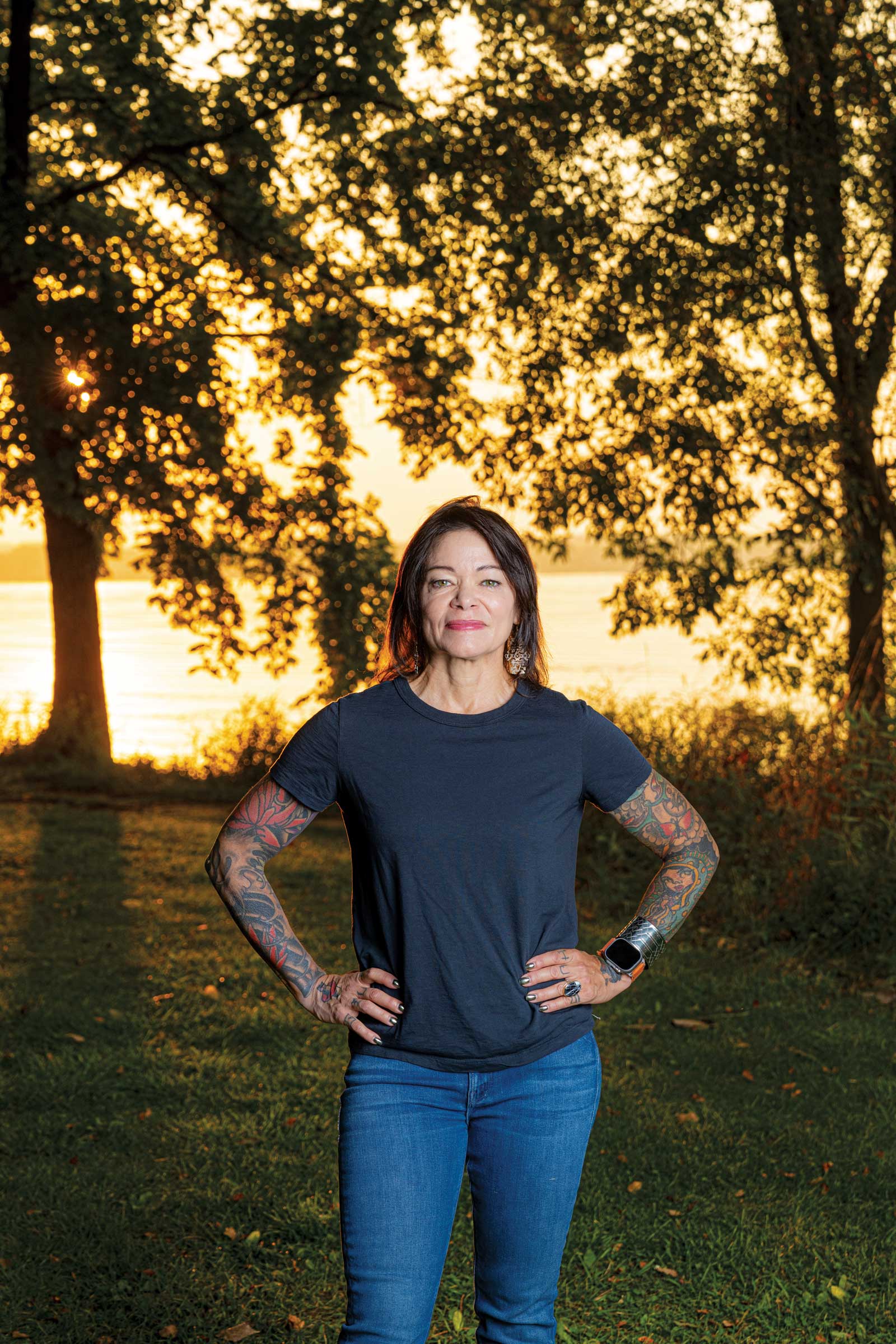
The Social Worker
One of the most rewarding parts of Heather Crowley’s work happens at random. She could be shopping for groceries, picking up coffee or just walking down the block in Madison. Someone will approach her with a smile on their face, looking healthier and happier than she’s ever seen them, and thank her for helping them turn their life around.
“We work with people during such vulnerable times in their lives,” says Crowley (’96, MS’03), who’s been a social worker for Dane County for 16 years and a behavioral health social worker at St. Mary’s Hospital in Madison for more than a decade. “When someone comes up to me and offers up their story and says they’re so proud of where they are, after having gone through a lot of struggles — it’s amazing to know that we made that connection and that impact.”
Crowley, a member of the Ho-Chunk Nation, came to campus after graduating from Holmen High School in La Crosse County. “I found my place at UW,” says Crowley, who joined the Wunk Sheek Native American student group on campus.
When someone comes up to me and offers up their story and says they’re so proud of where they are, after having gone through a lot of struggles — it’s amazing to know that we made that connection and that impact.
She considered an English major and a marketing major before her interest in social work was sparked. She was initially interested in addressing alcohol and substance use, but in her research she quickly found that these issues have deep roots.
“There are cycles of behavior, mental health and intergenerational trauma that affect people, and often a negative coping mechanism like drug or alcohol use comes from that,” she says. “If people don’t have the opportunity to heal, that can go on to impact future generations. Those cyclical patterns really interested me.”
After graduating with her undergraduate degree, Crowley went on to get her master’s in social work also from UW–Madison. That launched her career in social work and mental health, including time spent as a child and family therapist at the Mental Health Center of Dane County, working as a victim advocate for the Dane County District Attorney and picking up emergency department shifts at St. Mary’s. She joined Dane County as a social worker in 2009.
“I’ve seen clinical interventions around different ages and populations, but the young people have always stuck with me as a developmental stage where we really have the most ability to help someone change,” she says.
Crowley began at the county in child protection and human services, then youth justice, and was promoted to social work supervisor 10 years ago. She runs the Early Intervention Services Unit, which does a vast amount of work in the community. They operate in three school districts, do outreach to students at high risk of joining gangs, work in human trafficking prevention and intervention, and more. The unit is the only one of its kind in Wisconsin, aimed at reaching high-risk young people early.
“We’re starting something new here,” she says. “I think our work can help other counties and other social workers think forward about how to work with community and collaborate in a better way.”

